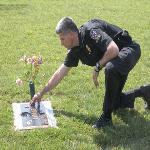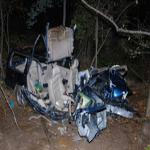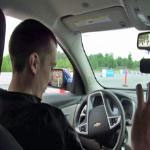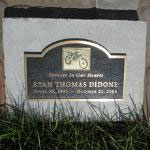
Ryan Didone was a typical, fun-loving teenager. He liked sports, riding his dirt bike and spending time with his friends and family.
But all that changed in a matter of minutes in the fall of 2008. Ryan and four of his friends were riding in a car when the driver lost control and hit a tree.

The impact was so severe it caused major injuries to all the car's occupants. Ryan was flown to a nearby hospital, where he died a short time later. He was only 15 years old.
Grieving father
Captain Thomas Didone has been with the Montgomery County, Maryland, Police Department for almost 25 years. He is Ryan's father.
"I was with my son the day he was born and I, unfortunately, had to be with my son in the hospital on the day he died. And that's something that I would never wish on any parent."
Distracted driving nightmare

Captain Didone says the crash that took his son's life was a direct result of distracted driving.
"It was an inexperienced, immature driver who felt that he was invincible; driving at night with a car load of kids. He was distracted, he was going too fast, and it ended up causing one death and serious trauma and tragedy for the rest of the community."
Ryan's story is a familiar one. According to government estimates, of the more than 30,000 U.S. highway deaths reported in 2008, nearly 4,000 (about 12 percent) involved drivers between the ages of 15 and 20. Most of those fatalities were the result of distracted driving.
And according to Jim Jennings, a spokesperson for Allstate Insurance Company, the number one cause of distracted-driving accidents is cell phones.
"If you're texting while driving, you are 23 times more likely to get into an accident than somebody who isn't," he says. "Reaching for a cell phone when it's going off, you're nine times more likely to get into an accident than normally driving. Talking on the phone and reaching for a cell phone is akin to having four beers and driving."
'An epidemic'
Ray LaHood, Secretary of the U. S. Department of Transportation, says distracted driving has become an epidemic.
"I've called it an epidemic in America because just about every American, including many teens, own cell phones and they think they can talk and drive and do it safely, and they can't," he says.
At an effort to curb this epidemic, government agencies and private companies are using public service announcements and safety events to raise awareness of the danger of texting, or even talking on the phone while driving.
At this recent insurance industry sponsor driver awareness session near Washington, D.C., teenage drivers tested their skills on a closely-monitored obstacle course to compare how they drove with - and without - distraction.
Orange cones was set up on the track represented curves in the road. And testers threw large, inflatable dolls - representing children - in front of the cars at random mements to test the driver's reaction time.

Sobering experience
Nineteen-year-old Kevin Schumann was one of the drivers. First, he drove without a cell phone, and was able to easily navigate around the cones and dolls.
But then he was given a cell phone and asked to start texting.
Almost immediately, his driving pattern started to change. Kevin drove erratically, knocked down several cones, and ran over at least one of the inflatable dolls.
Kevin said the experience was eye-opening.
"When you go over the cones...with the makeshift kids...that really opened up the experience for me to prove how bad it is to text and drive."
Debbie Pickford, another Allstate insurance representative at the training session, says there are a number of reasons why teens in particular are at risk of distracted driving.
"What we know from research on teen brain development, is that teens don't really have fully developed brains until they're 25 years old. Plus you take the immature brain development combined with inexperience, the young teen drivers have very little experience driving on the road. When you put those two things together, and you get a much, much higher risk," she says.
STAND UP Act
But things are starting to change.
New legislation that's been introduced in the U.S. Congress would require all states to implement what's called a "Graduated Driver Licensing" (GDL) system.
Under this program, young drivers are prohibited from nighttime driving, have limits to the number of passengers they can have in their cars at one time and will be ineligible for a full driver's license until they're 18.

The legislation creating the new teen licensing program is now pending in both the House of Representatives and the Senate.
In the meantime, people like Captain Didone are using their personal experiences to help educate teens and their families about the dangers of distracted driving. He travels the country, sharing his story with the hope that it may save other lives.
"I never thought I'd be one of those parents that got that phone call, but I was. So I recognize the fact that if it can happen to me, it can happen to anyone. We have to start doing things that are gonna make difference to change this behaviour. Because I really don't want to hear about 4,000 more kids dying next year."
Distracted Driving Says I don't is an issue that almost everyone has a personal stake.
inflatable: needing to be filled with air or gas before you use it 需充氣的
erratically: 不穩(wěn)定地
聯(lián)合國(guó)禁止其工作人員開(kāi)車(chē)時(shí)打手機(jī)
Text messaging while driving can be deadly
Getting clunkers and distracted drivers off the road
研究:開(kāi)車(chē)時(shí)發(fā)短信比酒后駕車(chē)更危險(xiǎn)
(來(lái)源:VOA 編輯:陳丹妮)
